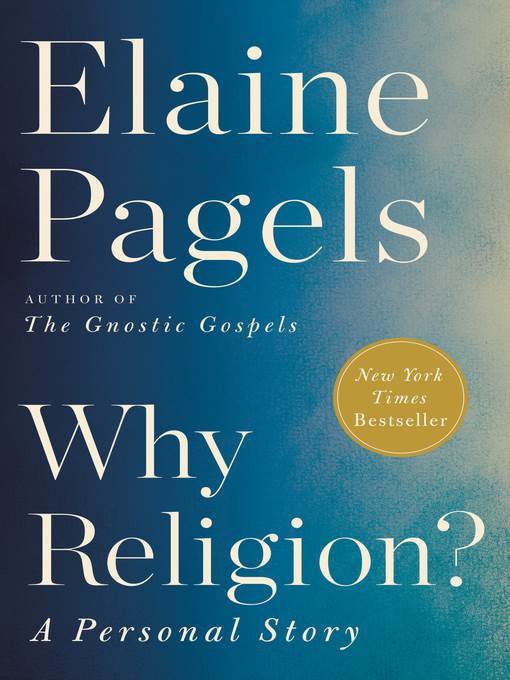
Why Religion?
A Personal Story
کتاب های مرتبط
- اطلاعات
- نقد و بررسی
- دیدگاه کاربران
نقد و بررسی

June 1, 2018
Drawing on her own research and that of neurologists, anthropologists, and historians, multi-award-winning MacArthur Fellow Pagels (The Gnostic Gospels) considers why religious belief endures today. But her meditations are refracted through the lens of personal tragedy: she's had to contend with the deaths of her young son and her husband. With a 200,000-copy first printing.
Copyright 2018 Library Journal, LLC Used with permission.

September 1, 2018
A famed religious scholar's poignant life story.Pagels (Religion/Princeton Univ.; Revelations: Visions, Prophecy, and Politics in the Book of Revelation, 2012, etc.), who is especially renowned for her work studying the ancient Gnostic brand of Christianity, provides a raw and often moving autobiography. The author begins in the postwar suburbs of Palo Alto, California, where she was raised by emotionally detached, and certainly nonspiritual, parents. A visit to a Billy Graham crusade awakened the young Pagels to the world of religion. "It changed my life, as the preacher promised it would," she notes, referring to Graham, "although not entirely as he intended, or at least, not for as long." By the time she was a student at Stanford, she had lost her basic faith in Christianity but remained intrigued by religion as a whole. She went on to earn a doctorate at Harvard, where she first encountered the newly discovered writings of the Gnostics, a sect that had been branded as heretical and was extinguished early in the history of Christianity. The author's academic pursuits unfold alongside a touching personal life story. After marrying physicist Heinz Pagels, the couple went on to have a son, who was eventually diagnosed with a fatal heart condition that took his life while he was still in kindergarten. As she was recovering from this tragedy, her husband fell while hiking and was killed. Much of the rest of the author's story involves her attempts to remain sane and stable while raising two other adopted children and continuing her career at Princeton. In the process, she went back to Scriptures and early Christian writings, not due to faith but as a way of understanding how others dealt with tragedy in the past. Pagels is a controversial figure in Christianity, heralded by many scholars and modernists yet derided by traditionalists, and her approach to God--amorphous and skeptical--will either offend or resonate with particular readers. The story of her grief, however, will touch all.A meaningful tale of pain and hope on the edges of faith.
COPYRIGHT(2018) Kirkus Reviews, ALL RIGHTS RESERVED.

Starred review from September 10, 2018
In this beautiful memoir, Pagels (The Gnostic Gospels), professor of religion at Princeton Univ. and recipient of a MacArthur Fellowship, addresses the titular question by recounting her life story. Raised in an intellectually atheist household, she “came to Christ” at a Billy Graham Crusade in the late 1950s. While her traditional Christian beliefs tempered over time, that conversion unlocked her spiritual imagination. With haunting echoes from the Book of Job (which she unpacks with skillful clarity), Pagels tells a story of love, marriage, and family life alongside a vibrant academic career. Her 1979 bestseller, The Gnostic Gospels, launched her to academic fame. Nearly a decade later, her six-year-old son, Mark, died of a heart problem, and her husband of 20 years, Heinz, died in a hiking accident. In her deepest grief, Pagels’s body was covered with boils, like Job’s—an acute stress reaction. She writes of feeling empty but fighting to remain strong in order to care for her two young children (“When we confront the unknown, any interpretation is provisional, necessarily incomplete”). Pagels treats readers to the examined life behind her intellectual feats with extreme grace and depth. This luminous memoir strips religion to its elementary particles: love, suffering, and mystery.

























دیدگاه کاربران